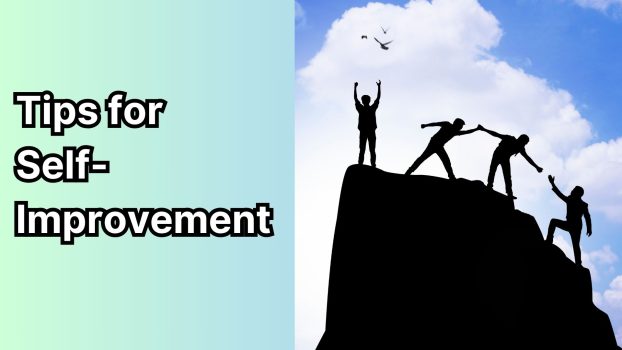Embarking on a journey of self-improvement is one of the most empowering decisions we can make in our lives. It’s about recognizing the areas where we want to grow, setting personal goals, and taking deliberate steps to achieve them.
Self-improvement is not just about fixing what’s broken; it’s about enhancing our overall well-being, boosting our self-esteem, and cultivating a positive mindset. Whether you’re looking to improve your mental health, expand your comfort zone, or simply become the best version of yourself, the right strategies and techniques can make all the difference.
In this article, I will share with you some practical tips and techniques to help you on your self-improvement journey, from setting SMART goals to surrounding yourself with positive people. Discover how these steps can help you achieve personal growth and transform your life for the better.
Establishing a Vision for Personal Growth
Define Your Goals
Defining your goals is a key step in your self-improvement journey. A clear and well-formed personal vision statement serves as the foundation for these goals. To start, you need to identify what you are passionate about and what you excel at.
This involves reflecting on your interests, skills, and values. Ask yourself: “What do I enjoy doing in my free time?” and “What are my professional and personal strengths?” Integrating these elements into your vision statement helps you align your goals with what truly matters to you.
Clarify Your Priorities
Once you have identified your goals, it’s essential to clarify your priorities. Your personal vision statement should reflect what drives you and what the world needs from you. Consider your core values and how they influence your decisions.
For example, if kindness and care for others are among your top values, your vision might include living a life that demonstrates these qualities to family, friends, and even strangers. Prioritizing what is most important to you ensures that your efforts are focused on achieving meaningful outcomes.
Create Actionable Plans
Having a clear vision and prioritized goals is just the beginning. To make real progress, you need to create actionable plans.
Break down your long-term goals into smaller, manageable tasks. For instance, if your vision includes becoming a more compassionate and effective leader, your plan might involve taking leadership courses, practicing active listening, and seeking feedback from others. Ensure that your plans are specific, measurable, achievable, relevant, and time-bound (SMART) to keep you on track and motivated.
This structured approach will help you stay focused and make steady progress toward your personal growth and development.
Cultivating Positive Habits and Mindsets
Embrace Positivity and Resilience
Cultivating a positive mindset is a cornerstone of self-improvement. Embracing positivity involves practicing gratitude, which can significantly enhance your happiness and attract more positive experiences into your life.
Take time each day to reflect on the things you are grateful for, no matter how small they may seem. Additionally, adopting an abundance mentality, where you welcome competition and trust in the goodness of others, can foster a more optimistic outlook on life.
This mindset shift helps you navigate challenges with greater resilience and confidence.
Practice Self-Care and Self-Love
Self-care and self-love are essential for maintaining a healthy and positive mindset. Incorporating healthy habits into your daily routine can make a significant difference.
Follow a balanced morning and nighttime routine that includes activities such as journaling, reading, and physical exercise. Journaling, for instance, allows you to process your thoughts and emotions, while reading can open your mind to new perspectives and knowledge. Physical exercise not only improves your physical health but also enhances your self-discipline and motivation.
Dedicate Time for Personal Reflection
Dedicating time for personal reflection is important for personal growth. Schedule effective breaks throughout your day to restore your focus and energy. Use this time to engage in activities that promote mindfulness, such as mindful breathing or a quiet walk.
Additionally, set aside time each day or week to reflect on your progress, celebrate your small wins, and identify areas where you need improvement. This reflective practice helps you stay aligned with your goals and fosters a deeper understanding of yourself, which is vital for continuous self-improvement.
Enhancing Interpersonal Relationships
Improve Communication Skills
Effective communication is the backbone of strong interpersonal relationships. To improve your communication skills, it is essential to practice active listening.
This involves giving the speaker your full and undivided attention, clearing your mind of distractions and judgments, and avoiding the temptation to interrupt. Showing open and positive body language, such as nodding and maintaining eye contact, also helps to keep your mind focused and shows the speaker that you are genuinely listening.
Additionally, rephrase or paraphrase what you have heard to ensure understanding and ask open-ended questions to elicit more information.
Build and Maintain Healthy Boundaries
Healthy boundaries are essential for maintaining respectful and balanced relationships. Setting clear boundaries helps you communicate your needs and limits effectively, preventing misunderstandings and conflicts.
It is important to be assertive yet respectful when expressing your boundaries. For example, you can say, “I appreciate your input, but I need some time to focus on this task,” without being confrontational. Healthy boundaries also promote mutual respect and trust, which are foundational elements of strong interpersonal relationships.
Seek and Offer Support
Seeking and offering support is a vital aspect of nurturing interpersonal relationships. Being empathetic and understanding towards others can make difficult conversations easier and foster deeper connections.
When engaging with others, try to hear the emotion behind their words and show that you understand their feelings. This can be achieved by reflecting on what they have said and asking clarifying questions. Similarly, don’t hesitate to seek support when you need it.
Surrounding yourself with positive people who can offer encouragement and guidance can significantly enhance your personal growth and well-being.
Conclusion
In your journey of self-improvement, it is important to remember that personal growth is a dynamic and ongoing process. Start by establishing a clear vision for your personal development, defining your goals, and creating actionable plans. Cultivate positive habits and mindsets by embracing positivity, practicing self-care, and dedicating time for personal reflection.
Enhance your interpersonal relationships by improving your communication skills, building healthy boundaries, and seeking and offering support. Remember, transformation is not just about the end result but also about the process.
Embrace challenges, take risks, and persevere through difficulties. Surround yourself with positive people and continuously reflect on your progress to ensure you are on the right path. Take the first step today.
Start with small changes and be consistent. Celebrate your small wins and learn from your setbacks. With persistence, self-awareness, and a positive mindset, you can transform your life and become the best version of yourself.
FAQ
What are my core personal values, and am I living a life that aligns with them?
To determine your core personal values, reflect on what is most important to you, such as honesty, compassion, or achievement. Identify the values that guide your decisions and actions. Then, assess whether your daily life, relationships, and goals align with these values.
If not, consider making adjustments to live more intentionally.
How do I react to challenges, and what coping mechanisms do I use?
To react to challenges effectively, use a combination of problem-focused and emotion-focused coping mechanisms. Problem-focused strategies include facing the problem head-on, breaking it into manageable steps, and seeking solutions.
Emotion-focused strategies involve practices like mindfulness, journaling your feelings, and engaging in hobbies or sports to reduce stress and anxiety.
What is something I’ve learned about myself recently, and how has it impacted my life?
Something you might have learned about yourself recently could be understanding your core values and beliefs. This awareness can significantly impact your life by guiding you to make choices that align with who you are, leading to better decisions at work and home, and a greater sense of purpose and fulfillment.
What are some obstacles that get in the way of my happiness, and how can I overcome them?
Obstacles to happiness include:
- Desire and Aversion: Compulsive craving and aversion can lead to addiction and impairment. Overcome these by practicing mindfulness and moderation.
- Negative Thinking Patterns: Pessimism, self-criticism, and catastrophizing distort reality. Challenge these patterns with Cognitive Behavioral Therapy (CBT) and mindfulness.
- Financial Stress: Creates significant stress and anxiety. Manage finances effectively and seek support if needed.
- Poor Relationships and Social Isolation: Foster healthy relationships and engage in social activities to combat loneliness.
- Mental and Physical Health Issues: Address chronic pain, illness, or mental health disorders through professional help and self-care.
- Self-Doubt and Insecurity: Use CBT and mindfulness to challenge negative thought patterns and improve self-esteem.







